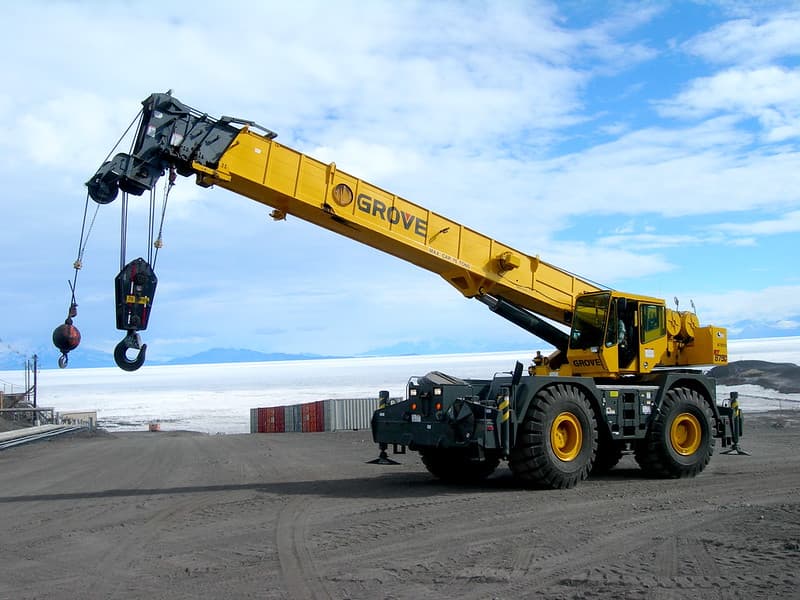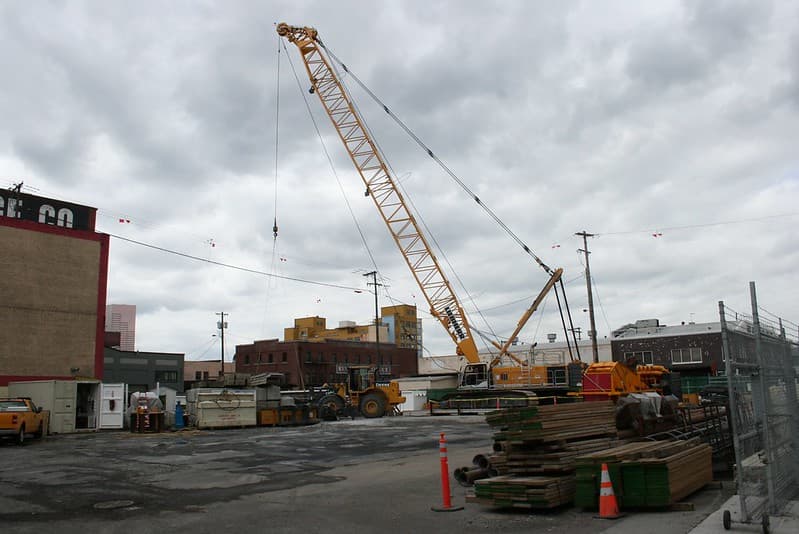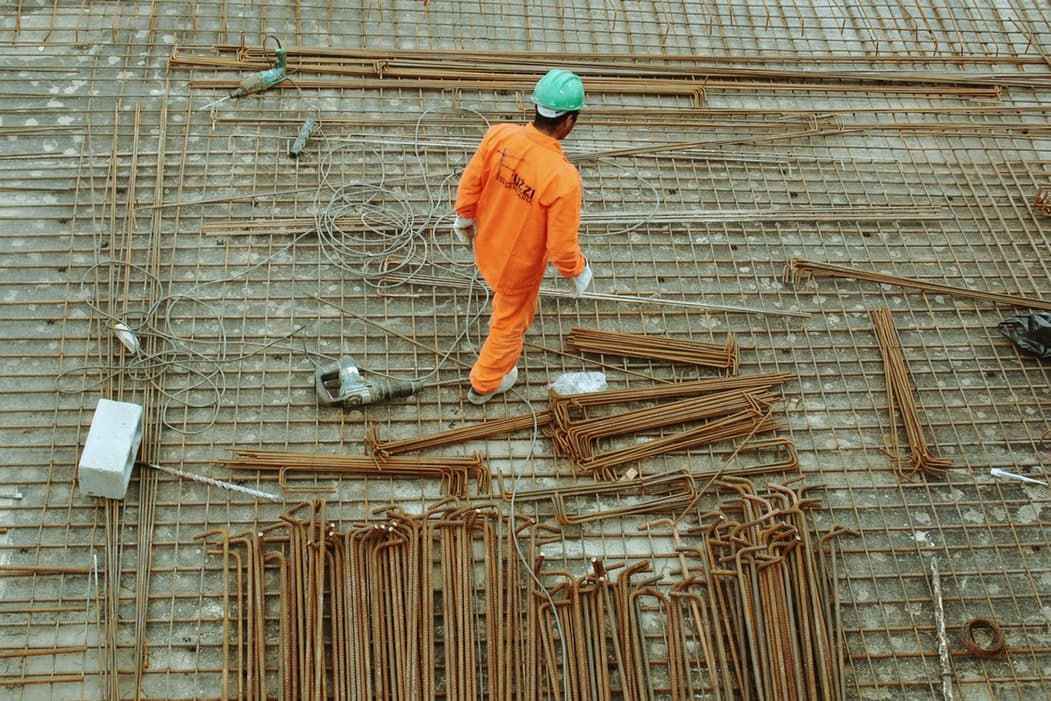Are you looking for a contractor?
Submit our quick form and get quotes now!
Table of Contents
4 min read
Crane Operator: A High-Rise Trade


4 min read
Crane Operator: A High-Rise Trade
Renovation tradesCrane Operator: A High-Rise Trade
Are you a thrill-seeking, mechanical engineering enthusiast with a passion for the great outdoors? Are you interested in a career that requires you to work under various conditions and face challenges that demand precision and critical thinking? If so, a career as a crane operator might just be your calling!
Tasks of a Crane Operator

Source: Eli Duke - Flickr
The main tasks related to this type of work consist of loading, unloading, and moving various materials to great heights. A crane operator can also be called upon to erect structures, build retaining walls, drive pilings into the ground, and operate a concrete pump. Lastly, this type of heavy machinery operator is responsible for maintaining, transporting, inspecting, and assembling various types of cranes.
There are three categories of cranes. Crane operators can manoeuvre all three or specialize with one in particular.
Boom truck crane, also known as a telescopic crane: You’ll be asked to work with heavy-duty hydraulic cranes (to move loads of 20 tons or more), moderate loads (5 to 20 tons), and wellheads (at sea, welding).
Tower crane: You’ll manoeuvre fixed cranes, overhead or bridge cranes to lift materials.
Mobile crane: This division includes conventional and hydraulic machines. These’ll be hoisted onto mechanical or hydraulic cranes capable of lifting 15-ton loads.
In greater detail, academic training and overall experience will teach future crane operators to:
Maintain, inspect, and lubricate machines;
Calculate the crane’s load capacity when it comes to rigging and hoisting;
Ensure the overall safety of the work zone, equipment, and their actions;
Evaluate the external conditions to effectively carry out tasks (wind speed, ground conditions, power lines, etc.);
Assemble on-site locomotive cranes;
Operate gantry or oil rig platform cranes needed to load and unload vessels;
Operate overhead or bridge cranes to lift or move machinery and materials;
Manoeuvre draglines on open-pit mining sites;
Use pile drivers to drive pilings into the ground to support new buildings;
Instruct apprentices about the trade in the field.
Most tradespersons have stated that they appreciate the fact that no two workdays are alike. In the span of a day, you can, for example, help build a condo tower, then install a giant Christmas tree downtown, hoist a grand piano up to the third floor of a retirement home, to finish off by loading a cargo ship.
Work Environment of Crane Operators
As you can imagine, this is an outdoors, boisterous trade, however, you’re often working from a control room/cabin, protected by a helmet or work earmuffs. Depending on the required workforce, the approved contracts and the worker’s skillset, it’s not unlikely that you’ll need to work outside of your area of residence, and you might even have to stay there for a certain period of time.
The crane operator trade isn’t only linked to the building industry. In fact, besides construction worksites, offers are coming in strong from the likes of transportation and storing companies, ports, railways, the mining sector, wholesale, and even for individuals.
Skills Needed to Manoeuvre a Crane

Source: Pawel Grzegorz - Pixabay
To really make the most of your studies and overcome challenges along the way, some personality types are more favourable when it comes to possibly becoming a crane operator.
According to the Holland Code (RIASEC) test, the authorities on the matter suggest that individuals with an RCE personality type are more likely to have the prerequisites to manoeuvre cranes. In other words, people who have a realistic, conventional, and enterprising sense of self, and enjoy carrying out concrete, defined, and thorough tasks. Moreso, they’re able to uphold certain sets of guidelines, be physically involved in their work, and manage important responsibilities.
Since any accident could have major consequences, a crane operator must have certain basic skills and knowledge such as:
Excellent eyesight;
Good physical endurance;
Good dexterity and instincts;
Patience, rigour, and meticulousness;
Strong critical thinking skills and good judgment;
Heightened sense of concentration and attention;
No fear of heights or enclosed spaces;
Enjoy working solo and in a team;
Mindful of rules, standards, workplace safety, and given responsibilities.
Becoming a Crane Operator: Training & Certification

Source: tara hunt - Flickr
The easiest and most common path to becoming a certified crane operator consists of completing a full-time training program (DVS), which consists of 870 hours, over a period of 7-8 months. However, this training is only offered in two institutions in Quebec: Centre national de conduite d'engins de chantier in Lévis and at the C.F. en conduite d'engins de chantier et de grues, at Atelier-école les Cèdres.
Diploma in hand, you’ll still need hundreds of hours of on-site experience to complete the training. First of all, crane operators begin their careers as apprentices, then they become journeypersons, and end up manoeuvring the cranes alone (however, monitored at first).
The job prospects for certified crane operators are excellent; more than 80% of students find work in their desired field once they’ve completed their training. In Quebec, crane operators have a median wage of $29.50 per hour. It obviously varies depending on the years of experience and the company in question.
In the last few years, it has become possible for individuals without a DVS to gain entry into the trade. However, a set training plan, which includes an exam, for said trade was established with the idea to offset the labour shortage.
To ensure that this option isn’t taken lightly, aspiring crane operators must be able to prove that they’re taking the necessary steps by providing a commitment letter from a prospective employer, obtaining an apprenticeship certification, and completing 150 hours of training and experience within a period of 3 consecutive months. Should these prerequisites not be met according to the set timeline, it’ll therefore be impossible to start over or complete the exam. In such a case, the individual will then have to complete a DVS.
To learn more about the program, exemptions, and apprenticeships, check out the CCQ website.
Cover photo source: Mix - Pixabay
Find a job in the renovation industry
RenoQuotes.com can guide you in your job search in the renovation industry. Tell us about your career prospects, and we'll help you get in touch with contractors who are likely to be interested in your skills, free of charge. Simply fill in our form (it'll only take a few minutes) and we'll take care of sending your candidate application to employers.
Dial 1-844 828-1588 to speak with one of our customer service representatives.
Last modified 2023-11-07
Looking for something else?
Related articles
The latest industry news, interviews, technologies, and resources.

RenoQuotes.com • 13 Mar 2024
Nowadays, it is hardly considered unusual for women to find themselves and thrive in the workplace, nor is it for them to pursue a position that was, formerly, geared toward men.

RenoQuotes.com • 07 Feb 2024
In the construction industry, sharing knowledge and mentoring new talent are essential to ensure a wave of succession and to promote the industry. Given this perspective, virtual mentorships prove to be a promising solution. On account of technological breakthroughs and the onset of custom platforms, you can now benefit from remote expert advice.

N/A • 07 Nov 2023
Your personality can truly shine by way of your home’s architectural details. As you've likely noticed, there are plenty of different style choices and preferences out there.

RenoQuotes.com • 07 Nov 2023
Planning and building a brand new home from the ground up is always an exciting venture. Of course, each home-build project is unique and will follow a specific set of rules and regulations. Where you build your home will dictate many of these regulations, as urban homes will have different needs than those constructed in rural areas.

Léa Plourde-Archer • 07 Nov 2023
At first glance, the role of a general contractor can seem vague. Acting as a conductor of sorts for home renovation projects, general contractors are responsible for ensuring the successful completion of the project, making sure that the whole process runs smoothly.